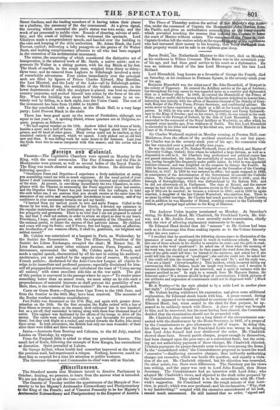,foreign an 42Dolonfal.
FnaNcE.—The Legislative Chambers were opened on Monday by the King, with the usual ceremonies. The Due d'Atunale and the Due de Montpensier were present, as well as several ladies of the Royal Family. The Kmg was much cheered on ascending the throne. He delivered the following speech- " Gentlemen Peers and Deputies—I experience a lively satisfaction at seeing you assembling round me with so much engerness. At the usual period of your labour I shall communicate with you respecting the internal and external affairs of the state. At present, in convoking immediately the two Chambers, in com- pliance with the Charter, in summoning the Peers appointed since last session, and the Deputies whom France has just honoured with her suffrages, to take the oath before me, I am anxious that you should receive at the same time the assurance of my active and unchangeable devotedness to our country, and' of my confidence in your sentiments towards me and my family.
"I learned from my earliest youth to love and serve France. Called to the throne by her wish, for the salvation of her liberty, I devoted my existence to the regular maintenance of her institutions, and to the peaceable development of her prosperity and greatness. There is no trial that I am not prepared to submit to, and that I shall not endure, in order to attain an object so dear to my heart. Providence, I hope, will permit me, with the cooperation of the Chambers and the national assent, to insure the success of that patriotic labour. My children and yours will reap its fruits; and if France, free and happy, retain an affection- ate recollection of our common efforts, it shall be, gentlemen, our brightest and noblest reward."
Mr. Cobden was entertained at a banquet in Paris, on Wednesday, by
the Societe des Economiates. The Duo d'Harcourt, President of the Societe des Libres Exchanges, occupied the chair; M. Horace Say, M. Leon Faucher, and many other eminent persons, Peers, Deputies, and littexateurs, surrounded the table. Mr. Cobden spoke in French, and made a capital speech, characterized by all his tact in suiting his auditory ; unobtrusive, yet not marked by the opposite vice of reserve. He quoted French authors; disclaimed for the Anti-Corn-law League all objects fo- reign to its immediate and professed purpose; especially disclaimed for him- self all propagandist pretensions; and introduced the toast of "Union among all nations," with some excellent side-hits at the war spirit. The gist of this portion is conveyed in the passage where he says—" To render peace something better than an armed truce, we must array on its side such a preponderance of material interests as shall prevent the possibility of war. Here, then, is the mission of the Free-traders!" He was much applauded.
CAPE OF GOOD Hors.—Papers from Cape Town to the 16th June, and flora the frontier to the 30th May, have been received. The accounts of the Border warfare continue unsatisfactory.
Fort Peddie was threatened on the 27th May, and again with greater deter- mination on the 28th. On the first occasion, the Kafirs retired with a loss of from fifteen to twenty men; on the second, their estimated loss is two hundred; but as a set-off, they succeeded in taking along with them four thousand head of cattle. This capture was facilitated by the efforts of the troops to drive off the enemy. The cattle were collected together in a spot favourable for protecting them; but they took fright at a rocket, and rushed towards the Kafirs, who drove them away. In both encounters, the British had only one man wounded: of their allies three were killed and three wounded.
Is/Dia.—Accounts from Bombay and Calcutta, to the 2d July, reached London on Thursday, by express.
From the Punjaub little is added to what was previously known. The small fort of Kotla, following the example of Kote Kangra, has surrendered at discretion. Quiet prevailed at Lahore.
Sir George Arthur, whose health had somewhat improved at the date of the previous mail, had experienced a relapse. Nothing, however, could in- duce him to suspend for a time his attention to public business.
The Governor-General and Commander-in-chief were still at Simlah.


























 Previous page
Previous page